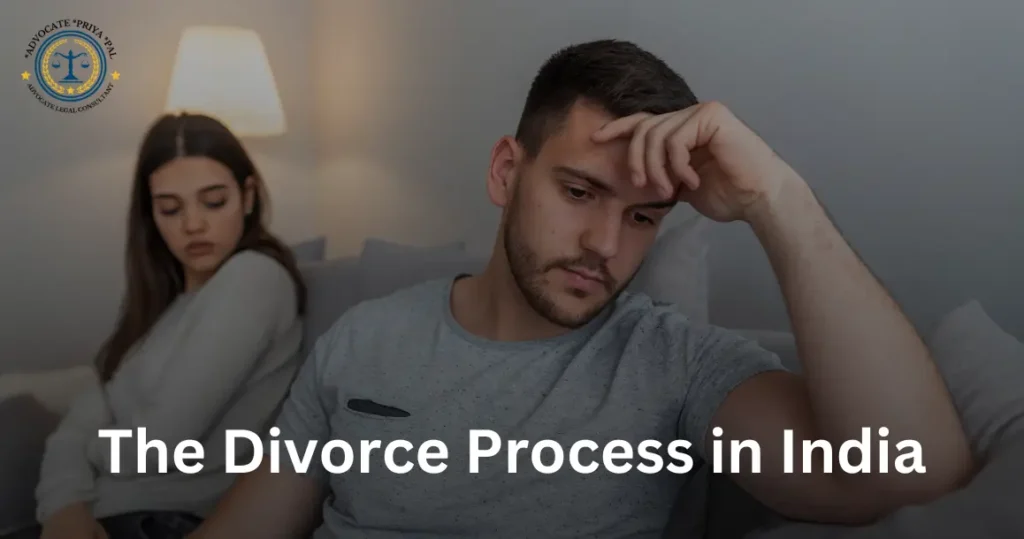
The Divorce Process in India: A Step-by-Step Guide
Table of Contents
Why Understanding the Divorce Process is Important
India has seen a steady rise in divorce cases, particularly in urban areas. According to statistics, divorce petitions in major cities have increased significantly, highlighting the importance of understanding legal procedures. Knowing the procedure for divorce in India helps you:- Save time by following the correct steps.
- Avoid common legal errors.
- Make decisions that align with your best interests.
Types of Divorce in India
Mutual Consent Divorce
In this type of divorce, both spouses agree to separate peacefully.Requirements
- A minimum of one year of separation.
- Proof that reconciliation is not possible.
Process
- File a joint petition in the family court.
- Appear in court for hearings.
- The court issues a decree after 6–12 months.
Benefits
- Quicker and less expensive.
- Avoids prolonged disputes.
Contested Divorce
In a contested divorce, one spouse files for separation without the other’s consent.Common Grounds for Divorce
- Adultery
- Cruelty
- Desertion for two years or more
- Conversion to another religion
- Mental disorder or unsound mind
Challenges
- Contested divorces take longer to resolve (2–5 years)
- They involve court hearings, evidence, and witness examinations
Divorce Procedures Under Different Laws
Each religion in India has its divorce laws that govern the process:Hindu Marriage Act, 1955
- Covers Hindus, Buddhists, Sikhs, and Jains.
- Mutual Consent Divorce: Both spouses must agree and file a joint petition.
- Contested Divorce: Can be filed on grounds like cruelty, desertion, or adultery.
- Documents: Marriage certificate, proof of separation, and evidence supporting the grounds for divorce.
Muslim Laws
- Covers both judicial and extra-judicial divorces.
- Judicial Divorce: Grounds include neglect, cruelty, and impotence.
- Extra-Judicial Divorce: Includes practices like Talaq, Khula (by the wife), and Mubarak (by mutual consent).
Christian Divorce Laws
- Governed by the Indian Divorce Act, of 1869.
- Grounds: Adultery, cruelty, desertion, or change of religion.
- Process: File a petition in a family court with evidence supporting the grounds for divorce.
Parsi Marriage and Divorce Act, 1936
- Grounds: Bigamy, cruelty, adultery, venereal diseases, or imprisonment.
- Mutual consent divorce is allowed under Section 32B.
Special Marriage Act, 1954
- Governs interfaith and civil marriages.
- Mutual and contested divorces follow similar procedures to the Hindu Marriage Act.
Step-by-Step Divorce Procedure in India
Filing a Petition
The process begins with filing a divorce petition in the family court. The petition must include:- Grounds for divorce.
- Personal details of both spouses.
Serving Legal Notice
The respondent (spouse) is notified of the petition and given time to respond.Court Hearings
- Mutual Divorce: Both spouses appear jointly.
- Contested Divorce: Includes witness statements, evidence, and multiple hearings.
Final Decree
After reviewing the case, the court issues the final divorce decree, legally ending the marriage.Role of Divorce Lawyers
- Importance of Hiring a Divorce Lawyer: A skilled divorce lawyer is essential for managing your case professionally. They handle legal complexities, ensure proper documentation, and represent your interests effectively in court, making the entire process smoother.
- Expertise in Family Law Matters: Choosing a lawyer with experience in family law is crucial for favourable outcomes. A Divorce Lawyer in Delhi. with a deep understanding of local legal systems, can provide tailored advice and strategies for your case.
- Assistance with Legal Documentation: Divorce lawyers ensure that all required documents, such as petitions, affidavits, and evidence, are properly prepared and submitted. This minimizes delays and prevents errors that could impact the case.
- Support for Women in Sensitive Cases: For women, especially in sensitive cases, consulting the Best Lady Divorce Lawyer in Delhi can make discussions about personal issues more comfortable. Female lawyers often bring empathy and understanding to such situations.
- Effective Negotiation and Mediation: A good lawyer not only represents you in court but also helps in negotiating settlements and mediating disputes. This can resolve issues like alimony, child custody, and property division without lengthy court battles.
- Guidance Throughout the Divorce Process: Divorce lawyers provide constant support, answering your questions and guiding you through every stage of the process. Their expertise ensures that you make informed decisions, saving time, effort, and emotional stress.
Divorce Mediation: A Faster Alternative
Mediation is an effective way to resolve disputes without going to court.Benefits of Mediation
- Saves time and money.
- Keeps personal matters private.
- Promotes amicable solutions.
How Many Divorce Cases in India?
With the number of divorce cases in India steadily increasing, more couples are turning to mediation as a practical solution. Mediation helps resolve disputes amicably and avoids the need for lengthy and expensive court battles. Understanding how many divorce cases in India how many divorce cases in India are filed annually highlights the growing importance of alternatives like mediation in simplifying the process and reducing emotional stress.Table of Contents
Frequently Asked Question
How much does the best lawyer in Delhi cost?
The cost of a lawyer in Delhi can vary widely depending on several factors, including the lawyer’s experience, reputation, and the complexity of the case. It’s difficult to estimate the cost of the “best” lawyer in Delhi, as there are many highly skilled and well-regarded lawyers practicing in the city.
How can I find the best lawyer in Delhi?
Finding the best lawyer in Delhi can be a challenging task, but there are several steps you can take to help you identify and select the right lawyer for your needs:
- Research online.
- Ask for recommendations.
- Check the Bar Council of Delhi.
- Schedule consultations.
- Consider fees.
Why is it important to find the best lawyer in Delhi?
It’s important to find the best lawyer in Delhi for several reasons:
- Legal expertise.
- Experience.
- Communication skills.
- Access to resources.
- Reputation.
Can I hire a lawyer from any city/state?
Yes, you can hire a lawyer from any city/state in India. With the advent of technology, it’s become easier to communicate with your lawyer regardless of their location.
What qualities should I look for in the best lawyer in Delhi?
It’s important to find the best lawyer in Delhi for several reasons:
- Legal expertise.
- Experience.
- Communication skills.
- Access to resources.
- Reputation.
Table of Contents

Advocate Priya Paul
Advocate Priya Paul, a proactive Delhi-based lawyer, leads a skilled team and shares legal insights through her blog to help readers navigate the law.

